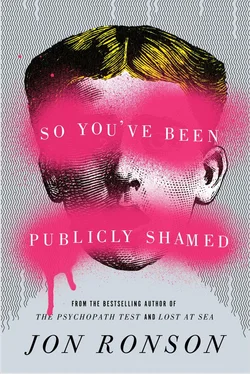“LeBon was from a provincial town in the west of France,” he told me over the telephone. “But he decided he wanted to go to medical school in Paris.”
This was a France so wary of the crowd that in 1853, when LeBon was twelve, Napoleon III commissioned the town planner Georges-Eugène Haussmann to demolish Paris’s twisted medieval streets and build long wide boulevards instead — urban planning as crowd control. It didn’t work. In 1871 Parisian workers rose up in protest against their conditions. They took hostages — local bureaucrats and police officers — who were summarily tried and executed. The government fled to Versailles.
LeBon was a great admirer of the Parisian elite (even though the Parisian elite didn’t seem in the slightest bit interested in him — he was making his living as an ambulance driver at the time), so he was hugely relieved when two months into the revolution the French army stormed the Commune and killed around twenty-five thousand rebels.
The uprising had been traumatizing for LeBon. And in its aftermath he decided to embark upon an intellectual quest. Could he prove scientifically that mass revolutionary movements were just madness? And, if so, could he dream up ways the elite might benefit from managing the insanity? It could be his ticket into the upper echelons of Parisian society because that was exactly the kind of thing an elite liked to hear.
He began his odyssey by spending a number of years among the Anthropological Society of Paris’s huge collection of human skulls. He wanted to demonstrate that aristocrats and businessmen had bigger brains than everybody else and were less likely to succumb to mass hysteria.
“He’d take a skull and fill it with buckshot,” Bob Nye explained to me. “Then he’d count the number of pieces of buckshot in order to determine volume.”
After measuring 287 skulls, LeBon revealed in an 1879 paper, “Anatomical & Mathematical Researches into the Laws of the Variations of Brain Volume & Their Relation to Intelligence,” that the biggest brains did indeed belong to aristocrats and businessmen. He reassured readers who might have been worried that “the body of the Negro is larger than our own” that “their brain is less heavy.” Women’s brains were less heavy too: “Among the Parisians there are a large number of women whose brains are closer in size to those of gorillas than to the most developed male brains. This inferiority is so obvious that no one can contest it for a moment; only its degree is worth discussion. All psychologists who have studied the intelligence of women, as well as poets and novelists, recognize today that they represent the most inferior forms of human evolution and that they are closer to children and savages than to an adult, civilized man. They excel in fickleness, inconstancy, absence of thought and logic, and incapacity to reason.”
He conceded that a few “distinguished women” did exist, but “they are as exceptional as the birth of any monstrosity… Consequently, we may neglect them entirely.”
And this, he argued, was why feminism must never be allowed to flourish: “A desire to give them the same education, and to propose the same goals for them, is a dangerous chimera. The day when, misunderstanding the inferior occupations which nature has given her, women leave the home and take part in our battles; on this day a social revolution will begin, and everything that maintains the sacred ties of the family will disappear.”
“When I was writing my biography of LeBon,” Bob Nye told me, “he seemed to me the biggest asshole in the whole of creation.”
—
LeBon’s 1879 paper was a disaster. Instead of welcoming him into their ranks, the leading members of the Anthropological Society of Paris mocked him, calling him a misogynist with shoddy scientific methods. “For LeBon, woman is seemingly an accursed being and he predicts abomination and desolation if woman leaves home,” the society’s secretary-general, Charles Letourneau, announced in a speech. “We naturally have all kinds of reservations about this conclusion.”
Stung by the humiliation, LeBon left Paris. He traveled to Arabia. He asked the French Ministry of Public Instruction to fund his trip, proposing to undertake a study of Arabians’ racial characteristics, which would be useful were they ever to “fall under French colonial domination,” but his request was denied and so he paid for it himself.
Over the next decade, he wrote and self-published several books on the neurological inferiority of Arabians, criminals, and exponents of multiculturalism. He was honing his craft. As Bob Nye solicitously put it in his biography of LeBon, The Origins of Crowd Psychology , he was now “concentrating on brevity, using no sources or notes, and writing in a simple and graceful style.” What Bob Nye meant was that there were no more skulls and buckshot, no more “evidence” gathering, just certainty. And it was in this style that, in 1895, he published the book that finally made him famous: The Crowd .
—
It begins with LeBon’s proud announcement that he isn’t part of any recognized scientific society: “To belong to a school is necessarily to espouse its prejudices.” And after that, for three hundred pages, he explains why the crowd was insane. “By the mere fact that he forms part of an organized crowd, a man descends several rungs in the ladder of civilization. Isolated, he may be a cultivated individual; in a crowd he is a barbarian — that is, a creature acting by instinct… In a crowd every sentiment and act is contagious.”
Every simile LeBon uses to describe an individual in a crowd highlights his or her mindlessness. In a crowd we are “microbes” infecting everyone around us, a “grain of sand amid other grains of sand, which the wind stirs up at will.” We are impulsive, irritable, irrational: “characteristics which are almost always observed in beings belonging to inferior forms of evolution — in women, savages, and children for instance.”
It is no wonder LeBon identified in women, ethnic groups, and children a universal trait of irritability, if that was the way he talked about them.
—
But The Crowd was more than a polemic. Like Jonah Lehrer, LeBon knew that a popular-science book needed a self-improvement message to become successful. And LeBon had two. His first was that we really didn’t need to worry ourselves about whether mass revolutionary movements like communism and feminism had a moral reason for existing. They didn’t. They were just madness. So it was fine for us to stop worrying about that. And his second message was that a smart orator could, if he knew the tricks, hypnotize the crowd into acquiescence or whip it up to do his bidding. LeBon listed the tricks: “A crowd is only impressed by excessive sentiments. Exaggerate, affirm, resort to repetition, and never attempt to prove anything by reasoning.”
—
The Crowd: A Study of the Popular Mind was, on publication, a runaway success. It was translated into twenty-six languages and gave LeBon what he’d always wanted — a place at the heart of Parisian society, a place he immediately abused in a weird way. He hosted a series of lunches— les déjeuners du mercredi —for politicians and prominent society people. He’d sit at the head of the table with a bell by his side. If one of his guests said something he disagreed with, he’d pick up the bell and ring it relentlessly until the person stopped talking.
All over the world, famous people began declaring themselves LeBon fans. Like Mussolini: “I have read all the work of Gustave LeBon and I don’t know how many times I have reread The Crowd . It is a capital work to which, to this day, I frequently refer.” And Goebbels: “Goebbels thinks that no one since the Frenchman LeBon has understood the mind of the masses as well as he,” wrote Goebbels’s aide Rudolf Semmler in his wartime diary.
Читать дальше












